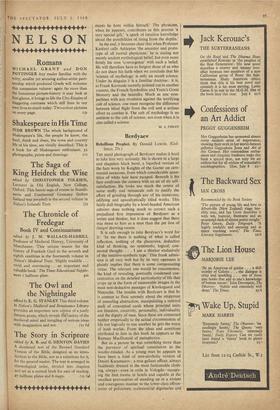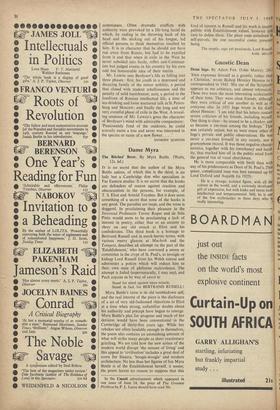Berdyaev
Rebellious Prophet. By Donald Lowrie. (Gol- lancz, 25s.)
THE usual photograph of Berdyaev makes it hard to take him very seriously. He is shown in a large and shapeless black beret,' a liquefied version of the hats worn by Knights of the Garter on cere- monial occasions, from which considerable quan- tities of white hair have escaped. Beneath it his face confronts the camera with an air of sly self- satisfaction. He looks too much the centre of some stuffy and minuscule cult to justify the effort of grinding through any of his numerous, edifying and apocalyptically titled works. This fairly dull biography by a level-headed American admirer does nothing much to correct such a prejudiced first impression of Berdyaev as a writer and thinker, but it does suggest that there was more to him as a man than the pet lion of emigre d ra wi ng-rooms.
It is safe enough to take Berdyaev's word for it: 'In me there is nothing of what is called reflection, nothing of the discursive, deductive kind of thinking, no systematic, logical, con- nected thought. . . I am a thinker exclusively of the intuitive-synthetic type.' This frank admis- sion is all very well but by its very openness it plainly implies that there is some compensating virtue. The relevant one would be concreteness, the kind of revealing, poetically condensed con- centration on the detailed particularity of life that crops up in the form of memorable images in the most non-deductive passages of Kierkegaard and Nietzsche. l'he trouble with Berdyaev is that he is content to float serenely about the empyrean
of consoling abstraction, manipulating a tattered pack of conceptual cards whose principal units are freedom, creativity, personality, individuality and the dignity of man. Since these are connected neither empirically to the actual circumstances of life nor logically to one another he gets the worst of both worlds. From the ideas and assertions attributed to him in this book he appears as the Ramsay MacDonald of metaphysics.
But as a person he wAts something more than the purveyor of spiritual consolation to the woolly-minded. As a young man he appears to have been a kind of non-alcoholic version of Dmitri Karamazov: a true gallant officer, always faultlessly dressed in the most fashionable cloth- ing, always—even in exile in Vologda—occupy- ing the best rooms in hotels and capable at the smallest provocation of standing up in a violent and courageous manner to the lower-class effron- teries of policemen, ecclesiastidal dignitaries and commissars. Often dramatic conflicts with authority were provoked by a life-long facial tic 'which, by ending in the throwing back of his head and the sticking out of his tongue, led official persons to think themselves insulted by him. It is in character that he should not have run away from Russia, but had to be expelled from it and that when in exile in the West he never subsided into facile, reflex anti-Commun- ism but judged events in his country by his own odd but honourable idea of their merits.
Mr. Lowrie sees Berdyaev's life as falling into three phases: first, his youth in a depressed and decaying family of the minor nobility, a period that closed with student rebelliousness and the penalty of mild banishment; next, a period in the forefront of Russian intellectual life, a time of tea-drinking and loose nocturnal talk in St. Peters- burg and Moscow; and finally the long and not very eventful phase of exile in the West. A reveal- ing sentence of Mr. Lowrie's gives the character of Berdyaev's mind with admirable compactness: 'Passionately fond of the outdoors, he could scarcely name a tree and never was interested in the species or name of a new flower. . .
ANTHONY QUINTON



























































 Previous page
Previous page